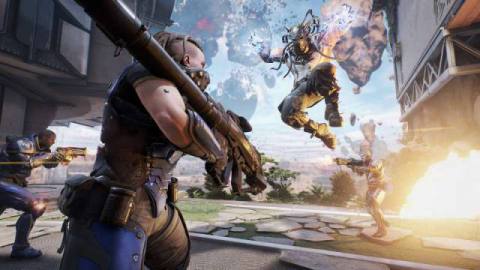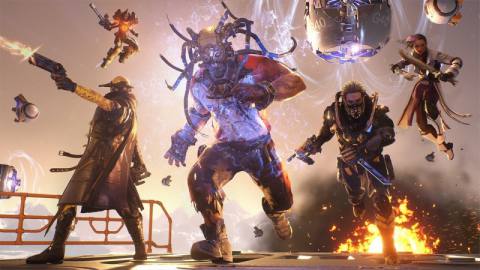
Games like Doom and Quake shaped my childhood in such a profound way. The run-and-gun shooter type is a go-to for me, almost a comfort genre, and it’s a genre that Boss Key Productions’ Lawbreakers slid into perfectly. Unfortunately, the launch was anything but successful and the studio behind the first-person shooter faded away into memory. But as we go into a new year and I look forward to seeing what other fresh adventures we can dive into, I can’t help but reflect back on how much joy Lawbreakers gave me and how sad I am that it didn’t last.
What I loved
Lawbreakers was released back in August 2017 and its goal was to challenge the more traditional FPS experience by implementing a gravity-defying mechanic that was ridiculously fun. While including some of the more expected features like an objective-based competitive experience, I truly believe that Lawbreakers had something truly special; something that spoke volumes of the passion the team had and the passion of Cliff Bleszinski, Boss Key’s co-founder and CEO.
The overall setup of Lawbreakers surrounded the idea of two teams of five going toe-to-toe to complete the game’s objective. One team played the “Law” aspect of Lawbreakers while the other team — you guessed it — played the “Breakers” role. There were a few modes to enjoy but my favorite was Turf War. Capturing three objective points is a pretty standard formula for this genre but the anti-gravity thrown into the mix made Turf War downright thrilling. With an objective being set to clear as many points as possible until the end of the match, this entire mode was a recipe for one giant mass of delightful chaos.
The anti-gravity also made modes like Team Deathmatch uniquely fun. The entire pacing of the game was chaotic and freeform. It offered a lot of freedom to the player in a market where gameplay is more often than not restrictive. It’s why I like Destiny 2’s PvP so much, being able to manipulate the very air around you for an edge in combat is exhilarating and Lawbreakers nailed this formula down to perfection.
The different roles for each faction offered a variety that genuinely kept the experience fresh. Rolling up as a Juggernaut was beyond satisfying, ripping through enemy players like rage incarnate. Being able to just casually throw off players like they were gnats was manically fun. Though obviously slower-moving, I think the Juggernaut was my favorite role to play because the damage was delicious and the destruction was bar none. The Gunslinger was fun, too, and I think a subtle reason why I went back to being a Hunter main in Destiny, and they operated similarly to rogues (like the Assassin role), which is usually my go-to when getting down on some RPG action.
Another way that Lawbreakers exceeded my expectations is how dying felt. As an avid Battlefield, Medal of Honor, etc. lover, dying in a match freaking sucks. I feel like a noob, I resentfully watch the kill cam with my teeth grinding dangerously, and I just want to murder out of a place of frustration (in-game — easy there, killer). With Lawbreakers, the very environment was teeming with life and vibrance, and that luster made the act dying more bearable than many other shooters on the market. The roles were allocated evenly and fairly, making death feel less like a failure of skill and more of a strategy misfire. Was that the case? Probably not, I have the precision of a walnut, but the game did make you feel better about those regretful moments of gravity-defying death.
Click here to watch embedded media
What went wrong
The game itself was met with positive critical reception, but sales did not reflect that eye in the slightest. What led to the poor sales that eventually caused the game’s servers to shut down just one year later? There are a few contributing factors to bear in mind.
Firstly, Lawbreakers had a hard time finding its place among other huge releases like Overwatch and the then-dominating battle royale experience PlayerUnknown’s Battlegrounds. Despite positive reception, people were just playing other games. Lawbreakers, much like similar games around that time like Battleborn, just couldn’t carve out the player niche needed to make it a competitor in a saturated shooter market.
Some have contributed the aesthetics of the game to be a reason for its demise, but games like Apex Legends prove that this isn’t necessarily the case, because Respawn’s battle royale shooter has a very similar style and even similar anti-gravity mechanics on a much lower scale.
Another crux was expectations and, let’s be honest, pre-launch boasting. Bleszinski has even noted this in the past, having been incredibly upfront about what led to the studio’s closure, and even how his own politics became a hindrance when being open about his own beliefs.
In an effort to experience similar levels of success games like Warframe and Rocket League had, Bleszinski has stated in the past prior to launch that shipping Lawbreakers was “a marathon and not a sprint,” which is true but not within the market that it was released into. When going up against already dominating games in the same genre, a clear strategy to show players what Lawbreakers does differently was key. While the pre-launch trailers did hype up the gravity aspect and gave sneak peeks at a few of the different roles, it’s clear in hindsight that a more aggressive push was needed.

The previous goal leading up to launch included maintaining just the right amount of concurrent players to ensure a decent matchmaking experience, hoping that the ease of access would make the game more playable — and enjoyable — for those hopping in a match. With that being a cornerstone of the strategy going into launch, the lower player count and failure to hook newcomers in thrusted everything else off the rails.
In a last-ditch effort to bring in new players and to save the studio behind Lawbreakers, Boss Key released its own take on battle royale when Fortnite was just being introduced (at the time, no one predicted Fortnite would become the massive hit it is today) from the team at Epic Games, which was Bleszinski’s previous employer. Radical Heights failed to compete against the heavy hitters dominating that particular market, making two titles in a row with low concurrent players and not enough revenue to keep the doors open.
Since then, Bleszinski has left games entirely (even though I’d love to see him return, but I understand the desire not to) while Boss Key co-founder Arjan Brussee returned to his former employer at Epic Games. While there were many stories spun from the rise and fall of the studio on social media, Bleszinski launched two games under his own studio and followed his passion. That’s something to be proud of. Unfortunately, that passion led him and his team into an already oversaturated market that only became more so in the following years.
While Lawbreakers couldn’t make it until the end, it’s a shooter that I genuinely love and I miss far more than is probably smart. I wish more people would have given it a chance and I wish that it could somehow get a second lease on life. That team did something beautiful and I will always treasure the small amount of time I had with it.
What were your thoughts on Lawbreakers and the Boss Key lifespan? Would you be interested in seeing a revival? Sound off with your thoughts in the comment section below and tell me what you thought of the shooter that dared to defy gravity.
